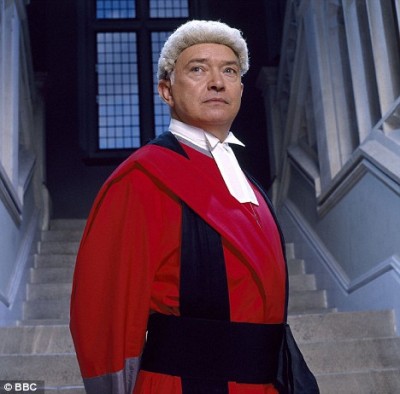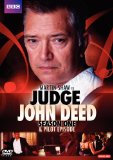| Reviews & Columns |
|
Reviews DVD TV on DVD Blu-ray 4K UHD International DVDs In Theaters Reviews by Studio Video Games Features Collector Series DVDs Easter Egg Database Interviews DVD Talk Radio Feature Articles Columns Anime Talk DVD Savant Horror DVDs The M.O.D. Squad Art House HD Talk Silent DVD
|
DVD Talk Forum |
|
|
| Resources |
|
DVD Price Search Customer Service #'s RCE Info Links |
|
Columns
|
|
|
Judge John Deed - Season One & Pilot Episode
The first six feature-length episodes (running about 88 minutes apiece), comprised of the pilot film and the first series, are included in this three-disc set, marred only by the BBC's incessant commercials (on all three discs!) and its grating anti-copying warnings, you potential thieves, you.
Like John Mortimer's Rumpole of the Bailey, Judge John Deed (Martin Shaw) is a liberal-leaning, unconventional legal advocate. And like Rumpole, Deed has no use for internal politics, corporate lawyers, ambitious barristers, dirty cops, corrupt judges, and anything else standing in the way of justice. This, in turn, makes Deed something of a pariah among his much more conservative fellow justices, just as Rumpole and the judges he stood before were sworn enemies. Series creator and writer G.F. Newman seems aware of these similarities considering his casting of Jonathan Coy as semi-regular David Stafford-Clark, QC. Coy played Henry the clerk on Rumpole, making this something like a promotion for him.
(Deed's name suggests Frank Capra's populist hero, Longfellow Deeds, or as reader Sergei Hasenecz proposes, novelist Robert van Gulik's Chinese detective Judge Dee.)
The differences, of course, are that Deed is a powerful High Court judge with much latitude in which to make rulings, and he's also suavely handsome. However, like Rumpole, Judge John Deed has his share of personal problems. Deed has no She Who Must Be Obeyed. Divorced from his corporate shill barrister wife (Caroline Langrishe), Deed instead is portrayed as something of a rake, an outrageously conceited womanizer.
QC Barrister Jo Mills (Jenny Seagrove), his former pupil, clearly loves him but constantly has to put up with his insensitive behavior. In series one Deed openly pursues Francesca Rochester (Gemma Redgrave), the glamorous wife of cold fish Sir Ian Rochester (Simon Chandler), one of Deed's chief opponents. In one scene Deed in public all but sticks his tongue down her throat while Jo and Sir Ian look on, appalled at Deed's callousness.
It's an interesting approach for a leading character, making him at once an extremely humanistic, sensitive judge who's also enormously charismatic - yet also a real bastard when it comes to women.
Other notable characters include Deed's ex-father-in-law, Sir Joseph Channing (the grandly theatrical Donald Sinden), a symbol of the establishment; Deed's university student activist daughter, Charlie (Louisa Clein); and his devoted clerk, Rita "Coop" Cooper (Barbara Thorn).
The program shows much intelligence as it grapples with complex legal and moral issues (e.g., the culpability of company executives when onsite safety regulations are ignored), and though its accuracy has been criticized in some quarters Deed's rulings at least seem authentic and reasonable. Certainly they're less outrageous and theatrical than Horace Rumpole's courtroom antics, though sometimes no more likely in a real world sense. The program may take dramatic licenses as liberal as its advocate judge, and at times the characters are black-and-white stereotypes, but each show is thought-provoking and brings attention to interesting legal dilemmas and moral ambiguities.
Martin Shaw is a big star in Britain yet all but unknown in the U.S., mainly because he's made few films and most of his television work has yet to be exported and widely seen. He's terrific, charming and roguish off the bench, dignified yet sensitive while sitting. Indeed, everyone in the regular cast is spot-on. The show itself is handsomely produced with good production values.
Video & Audio
Five feature-length episodes in 16:9 enhanced widescreen are spread over three single-sided discs. A disheartening disclaimer notes, "Due to music clearance issues certain edits have been made." I didn't notice any jarring cuts; then again I was seeing these episodes for the first time. It's a shame American music rights holders charge a king's ransom for the shortest snippet of even an obscure song. The shows may not have been shot in 35mm but they have that film-like sheen about them. It's an impressive looking program. The Dolby Digital stereo is fine also, and optional English subtitles are included for the deaf and hearing impaired. There are no Extra Features.
Parting Thoughts
Despite some criticism in Britain by legal eagles and conservatives who found the series at times far-fetched, Judge John Deed strikes this reviewer as extremely intelligent, expertly crafted entertainment that's thought provoking and eventually utterly engrossing. Highly Recommended.
Stuart Galbraith IV's latest audio commentary, for AnimEigo's Musashi Miyamoto DVD boxed set, is on sale now.
|
| Popular Reviews |
| Sponsored Links |
|
|
| Sponsored Links |
|
|
| Release List | Reviews | Shop | Newsletter | Forum | DVD Giveaways | Blu-Ray | Advertise |
|
Copyright 2024 DVDTalk.com All Rights Reserved. Legal Info, Privacy Policy, Terms of Use,
Manage Preferences,
Your Privacy Choices | |||||||














